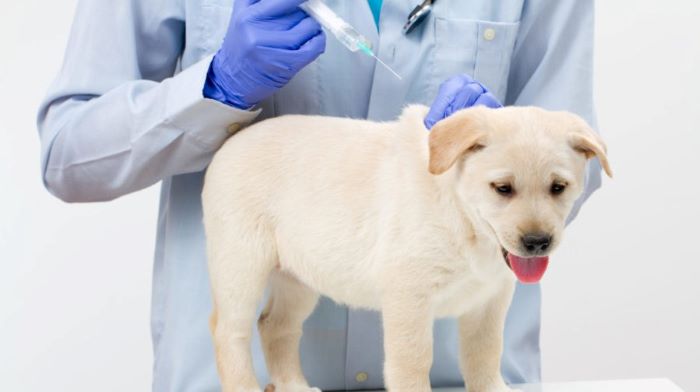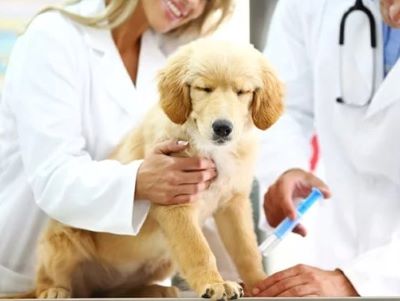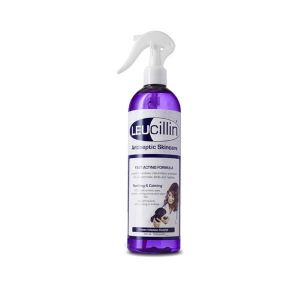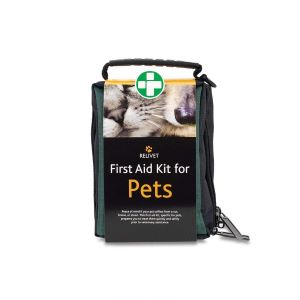Vaccines are preventive medicine to protect your dog against several fatal diseases. You might question What is the DHLPP vaccine for dogs? DHLPP stands for Canine distemper, hepatitis, leptospirosis, parvovirus, and parainfluenza.
You might get worried about these terms and wonder why is it necessary to give DHLPP vaccine to your dog? Your veterinarian might have told you to get your dog vaccinated when he was a puppy.
DHLPP vaccination is a preventive measure that every dog parent should take seriously. Let’s learn about this term and the main purpose behind this vaccine.

You Might Also Like:
What Does DHLPP Mean?
DHLPP is a combined or polyvalent vaccine which is a 5 in 1 vaccine as it prevent your dog from 5 severe illnesses. Ideally, it is provided to a puppy of the age 6–8 weeks and boosted twice at 3-week intervals and again a year after.
Let me help you understand DHLPP vaccine so that you can help your furry pet to live a long and healthy life.
Canine Distemper
Distemper in dogs is widespread, serious, and often fatal. It can affect any carnivore, whether wild or domesticated. In dogs, this is usually observed in little pups of the age 3 to 4 months. But, it can also occur in older dogs.
This virus is communicable by air and when your pooch comes in contact with infected toys or directly another diseased animal. The initial signs and symptoms of distemper includes, loss of appetite, lethargy, fever, conjunctivitis (runny eyes), and sometimes a nasal discharge. As the days go on, you may notice the serious signs like diarrhoea, convulsions, pneumonia and paralysis.
This ailment mostly targets every system in the body, but mostly it affects the dog’s nervous system. As a result, this is a serious health concern that frequently results in the death of the animal.[1]
Canine Hepatitis
Canine Hepatitis is a contagious viral disease that affect dog’s liver. This disease spreads when your dog gets in contact with another infected dog’s urine. But, you have no reason to worry, because the canine strain of this disease is not communicable to humans.
The symptoms you might observe are fever, enlarged liver, pain, and it can even cause death. It is better to keep your dog vaccinated to prevent them from such fatalities.
Canine Leptospirosis
Leptospirosis is an infectious bacterial disease which spreads from urine of an infected dog, rat or any other wild animal. Infection arises through oral mucous membranes, the cornea of the eye and the skin.
When your dog prefers to take a poo outdoors, he is at a risk of getting this bacterial infection. The symptoms might include high fever, jaundice, depression, internal bleeding, and eventually death. Recovered animals may suffer from chronic kidney disease.
This bacterial infection is a serious concern because it can even get transmitted to humans. Generally, dogs become the transporters of such bacteria so, to control such disease, DHLPP Vaccine plays an important role.

Canine Parvovirus
Canine Parvovirus is a deadly virus that usually occurs in little puppies. It is a highly contagious illness which results in bloody stools and vomiting and there is a possibility that you have to hospitalize your dog. In fact, in most of the cases they die even after providing many costly treatments.
Parvo virus is mostly transmitted through infected dog’s faeces, and it can easily get carried away on their fur or feet. It can even spread when a healthy dog gets in touch with the toys and bowl of the infected animal.
This virus mainly affects the intestinal cells, which are the rapidly dividing cells. As these gets ruptured, nothing will get absorbed in the intestine, and it will lead to bloody diarrhoea and can quickly dehydrate the animal and recovery is nearly impossible.
Certain measures that you can take to control the transmission are, to avoid contact with another dog and using chlorine based disinfectants.

Canine Parainfluenza
Canine Parainfluenza is a viral upper respiratory disease in dogs. It often goes unnoticed due to its mild symptoms. The virus spreads through nasal secretions and can lead to tracheobronchitis.
As per Peggy Adams (animal rescue league), it is recommended to vaccinate puppies against Canine Parainfluenza as early as 8 weeks old. Vaccinations should be given every 2 to 4 weeks until the puppies are 16 weeks old. After that, an annual booster shot should be provided.
What Are the Side Effects of DHLPP Vaccine?
I guess now you have understood, What Is the DHLPP Vaccine for Dogs? But, there are minor side effects of DHLPP vaccine that you might observe, such as:
- Dog might be facing Weakness and collapsing
- You might observe Facial swelling
- Your dog is having continuous Vomiting
- You might notice Diarrhoea
- You may observe Hives on dog’s body
- There is uncontrollable Itching
If you observe that your dog demonstrates any of these symptoms, it is likely a sign of an allergic reaction, and you should call your veterinarian for help and advice. As the immune response will get triggered, you might notice that your dog is feeling tired and worn out all day.

Summary
These furry friends already have a short life span as compared to humans, and certain viruses and bacteria can severely affect their health and even cause death.
As mentioned earlier, if you avoid any of these vaccinations, then you might put your dog in danger. Although, DHLPP vaccine is not a legal need like rabies vaccination, but it is mostly advisable by the vet to keep your dog away from ailments like distemper, hepatitis, leptospirosis, parvovirus, and parainfluenza.
FAQs
How often does my dog need Dhlpp vaccine?
It is advisable that little pups should receive the first dose of DHLPP when they are 6–8 weeks old. Another dose is provided every 3 weeks until they are 16–20 weeks old. Then a booster shot is given after a year.
Which dog vaccines are absolutely necessary?
The core vaccines that should be provided to your pet are Rabies, Distemper, Parvo virus, Adenovirus Type 1 and Adenovirus Type 2. [2]
How Does the DHLPP Vaccine for Dogs Work?
This vaccine contains some amount of CDV, CAV-2, Leptospirosis, Parainfluenza, and Parvovirus viruses which are modified to ensure that they do not make your dog ill, but they are able to activate an immune response. When your dog is vaccinated, their immune system is able to recognize the viruses so that it can attack them if they ever enter via infection.
What happens if I vaccinate my dog late?
If your pup is 2–3 weeks late for vaccination, then missing a vaccination can lead to suppressed immune system, and it increases the risk of many diseases which can even cause death.
References:
- Distemper in dogs. (n.d.). PDSA.
- Dog Vaccines in Arlington TX | Dr. Mike’s Afforable Vet. (n.d.).






